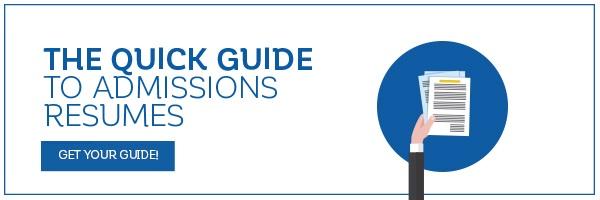|
Six Tips For Better Resumes |
||
Six Tips For Better Resumes

Before starting your resume, learn as much as possible about the school you’re applying to.
Need advice on how to make your “greatest hits” shine? Looking for ways to grab the adcom’s attention with a resume that highlights your academic prowess, professional strengths, leadership skills, and overall impressiveness? The following six tips will help you create a stunning resume that’s sure to boost your competitiveness and increase your chance of getting accepted:
1. Know your target school. The best way to convince the adcom that you’re best for their school, is to understand the school’s mission, strengths, and ideals. Before starting your resume, you should learn as much as possible about the school you’re applying to. Then, customize your resume to reflect the aspects of your background that are most relevant to your target school. Without copying the language on the school’s website verbatim, you must make sure that your resume addresses their mission/strengths/ideals and include the right “keywords.”
2. Know yourself – your skills and your accomplishments. What skills are you particularly good at? What accomplishments are you proudest of? What have you achieved that gained you the most recognition? Interview yourself and inventory your previous jobs, the skills you acquired, and your “greatest hits” as a professional – the times when you impacted your organization the most. Look through your formal performance reviews for glowing appraisals, scan your work files for successes you may have forgotten about, or keep a personal career folder where you keep track of new skills you’ve learned or the comments of happy customers.
3. Be concrete, specific, quantitative. Don’t say “Developed e-commerce plan that was selected for implementation” when you mean “Designed $5 million e-commerce strategy that increased revenues by 12 percent and attracted six new clients.” If you work for a private company and can’t disclose revenue figures, refer to percentage increases or improvements or cite the improved industry ranking of the organization’s product or performance as a result of your contribution. Think of numbers and other hard details as the proof that you can deliver.
4. Know your negatives. The vast majority of us have screwed up once or twice in our careers: been downsized, locked in a dead-end job, or just failed to work to our full potential for a time. You can’t lie about these career plateaus (see Tip #5) but you can present them in the best possible light so you have the chance to explain them fully if they come up during the interview or if you’re given the chance in an optional essay. With the right strategy you can deal with everything from typecasting and job-hopping to limited experience and unemployment.
5. Don’t lie. Making up degrees, accomplishments, and other personal and professional facts is always a bad idea. Don’t do it – it’s unethical and potentially self-destructive. Schools won’t hesitate to show students the door when they learn their resume, or any other parts of their application, are more fiction than fact. But even less brazen forms of dishonesty should stay far from your resume. For example, if you were one of six members of a team of managers with equal rank and responsibility, don’t say you “Served as lead of six-member management team.”
6. Use design elements to enhance your resume. The skillful use of understated design elements can result in an eye-catching resume that projects a sophisticated, successful image. These elements can be uncomplicated, such as using white space generously or replacing the traditional round bullet with the less common diamond- and arrow-shaped bullet. Or they can be more complex, such as using expanded text (kerning) to highlight a key term or enclosing the professional profile section of your resume in a shaded box. In general, make sure your typeface is readable. And if your target school specifies format rules (particularly regarding margins, page number, and font), be sure to follow theirs to a T. This may mean toning down your creative flair for design to fit their standard.
If you’re not sure how to develop a comprehensive profile or you’re too busy achieving to do damage control on a negative, call an Accepted.com consultant. Let professionals highlight your competitiveness. We’ll be glad to help. You’re outstanding, so shouldn’t your resume be outstanding as well?
• Leadership in Admissions
• Sample Resumes and Cover Letters
• 9 Do’s And Don’ts For Your Application Resume
Tags: Admissions Consulting, College Admissions, Grad School Admissions, Law School Admissions, MBA Admissions, Medical School Admissions, resume
The post Six Tips For Better Resumes appeared first on Accepted Admissions Consulting Blog.
![]()


[0] Comments to this Article